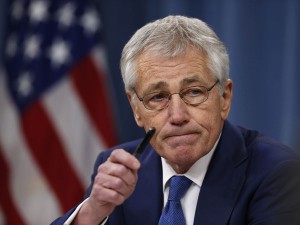WASHINGTON – Pentagon chief Chuck Hagel on Friday praised a decision by Japanese officials to allow the relocation of a US air base in Okinawa, calling it a “milestone” for relations with Tokyo.
Hagel welcomed the approval of the long-delayed move of the US Marine Corps base, which he said would permit a redeployment of American forces in the area and bolster Washington’s strategic “rebalance” to the Asia-Pacific region.
“Reaching this milestone is a clear demonstration to the region that the alliance is capable of handling complex, difficult problems in order to deal effectively with 21st century security challenges,” Hagel said in a statement.
“Our alliance has helped underwrite regional peace, stability, and prosperity for more than half a century, and resolving these years-long issues will enable us to take our relationship to the next level as we revise the guidelines for US-Japan defense cooperation,” he said.
After more than 17 years of debate and political wrangling, the local government in Okinawa has given a green light to moving the Futenma air station from a densely populated urban area to a new facility to be constructed on the coast.
Hagel said he had told Japanese officials that the Pentagon was “committed to working with the government of Japan to build a strong and sustainable US military presence with less impact on the people of Okinawa.”
Relocating the controversial air base is part of a plan to cut back the overall US military presence in Okinawa. The Pentagon plans to reduce the number of Marines on the island from 18,000 to about 10,000 in coming years, with some redeployed to Australia and the US territory of Guam.
Resolving the future of the air base in Okinawa clears the way for Washington’s so-called “pivot” to Asia, with plans to deploy more ships and troops in the Pacific.
“The realignment effort is absolutely critical to the United States’ ongoing rebalance to the Asia-Pacific region and our ability to maintain a geographically distributed, operationally resilient, and politically sustainable force posture in the region,” Hagel said.
The rebalance is designed to counter China’s growing military might and influence in the Pacific, amid growing tensions over territorial disputes.
US defense officials called Japan’s decision a landmark step that eliminated the last political hurdle to the relocation and removed a time-consuming issue from Washington-Tokyo relations.
“It opens up the bandwidth at a senior level for other issues to be discussed,” said a senior official, who spoke on condition of anonymity.
The agreement calls for moving to a new base on Okinawa’s northern coast by 2022 but if Japanese construction efforts move at a faster pace, the United States would be ready to move earlier, officials said.
Republican lawmaker John McCain, a member of the Senate Armed Services Committee, said the decision was a “major achievement for Okinawa, for Japan, and for the US-Japan alliance — an achievement for which Prime Minister (Shinzo) Abe and his administration also deserve much credit.”
McCain also said it was crucial that the estimated cost of the relocation of the base be “strictly adhered to over the years ahead.”
